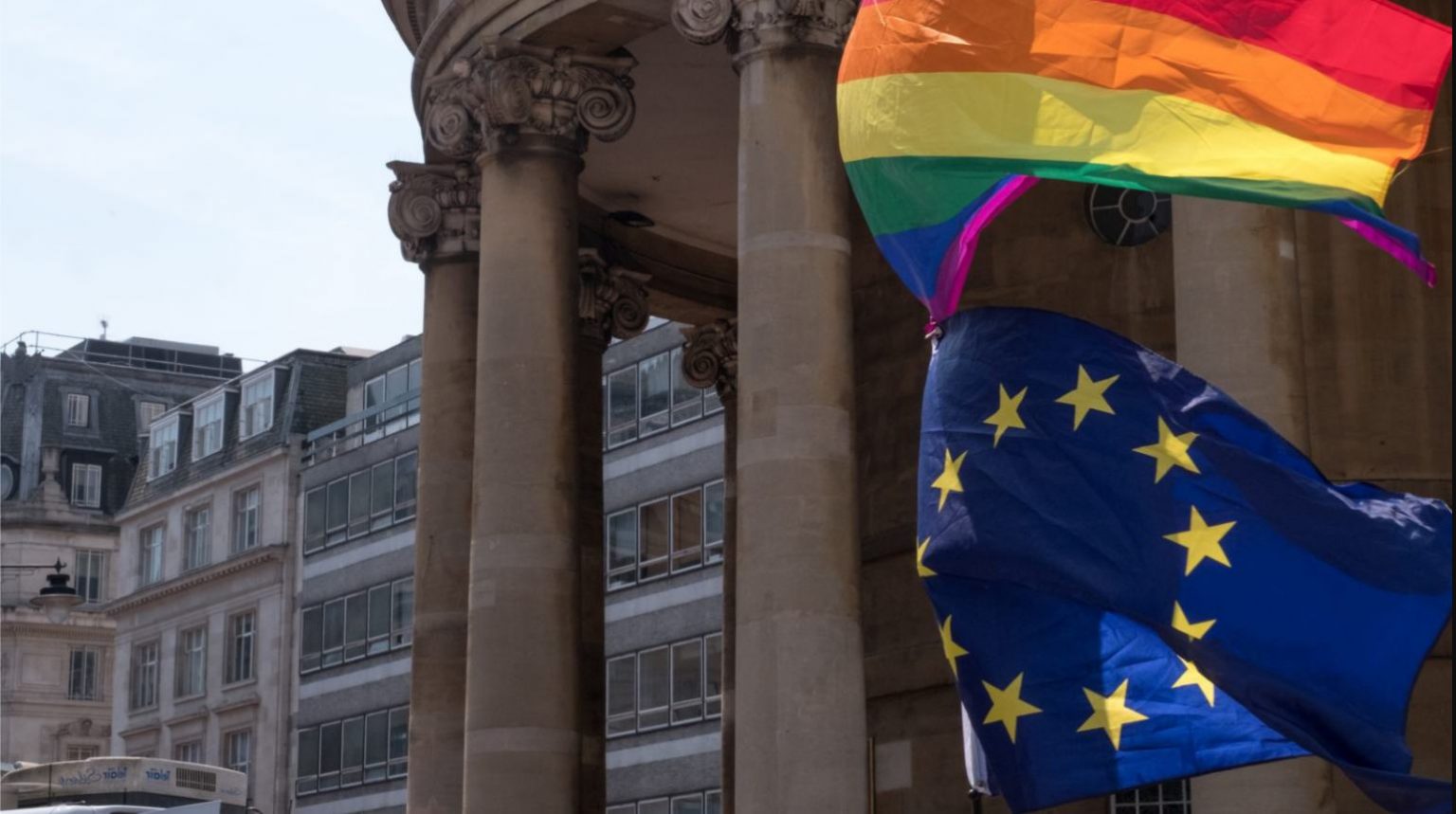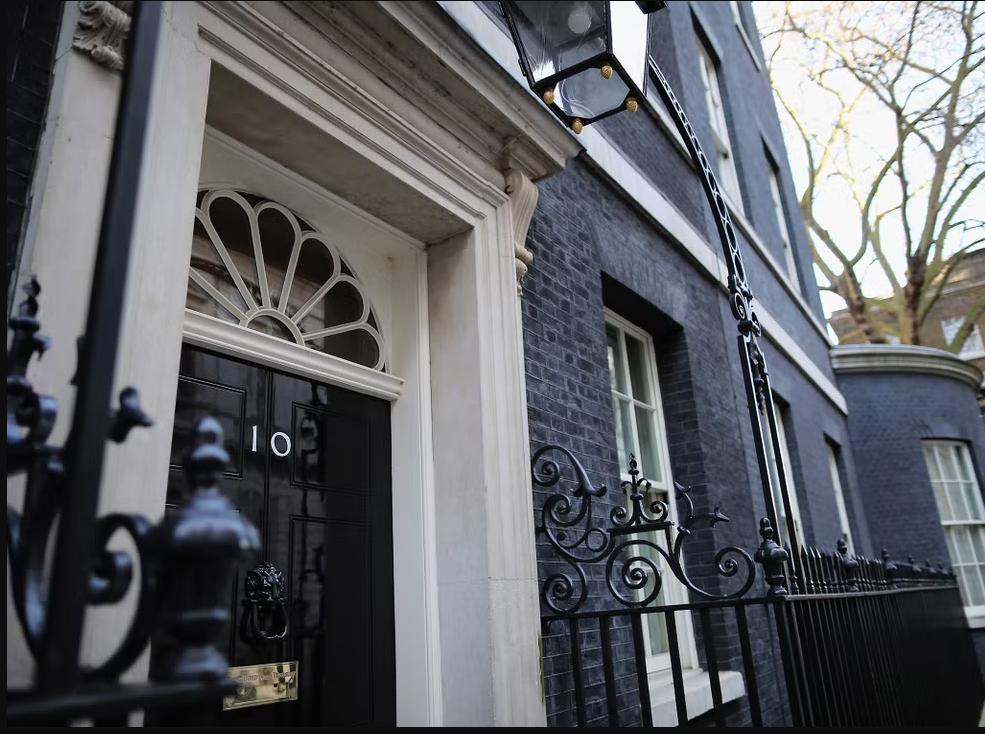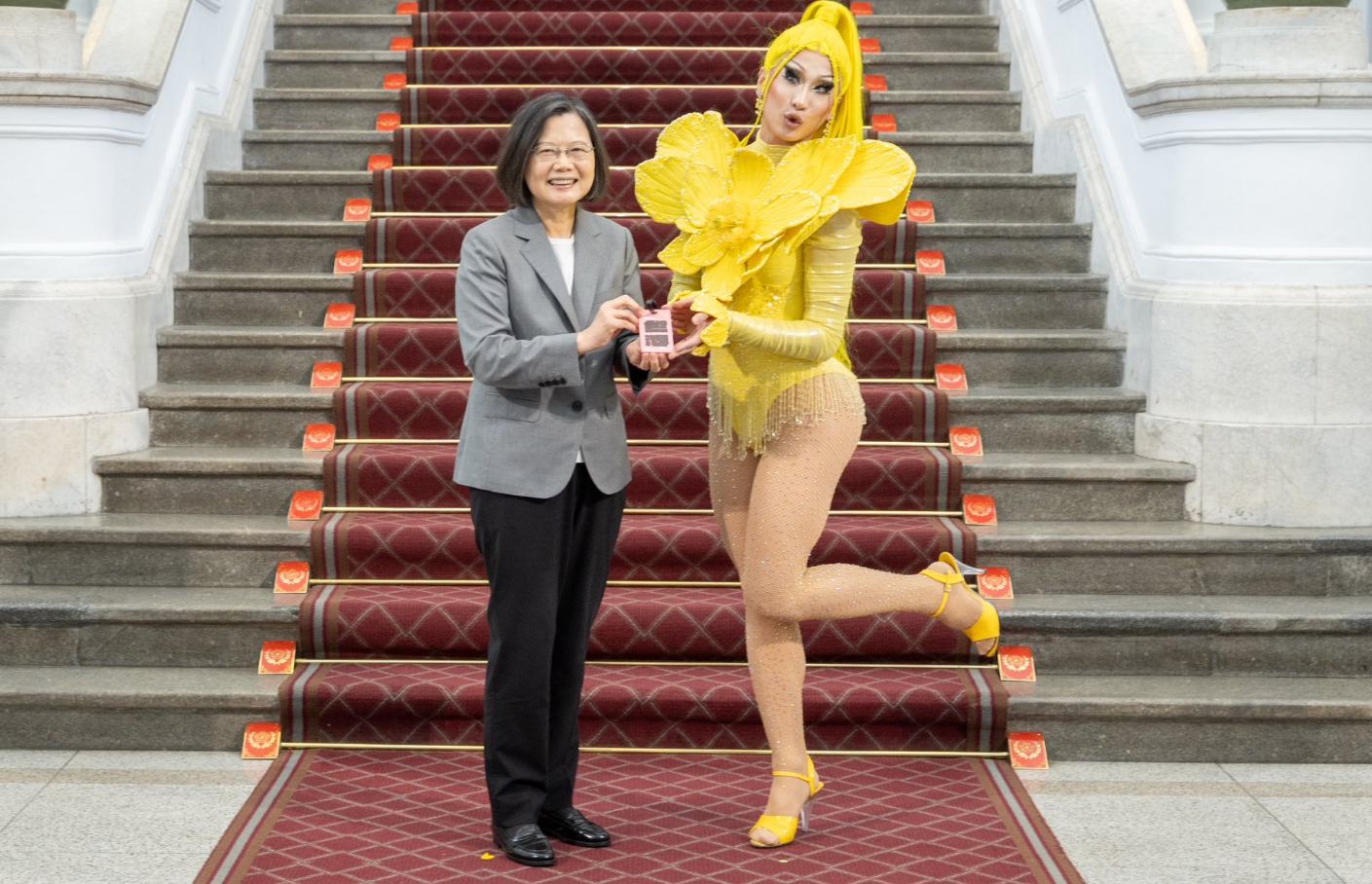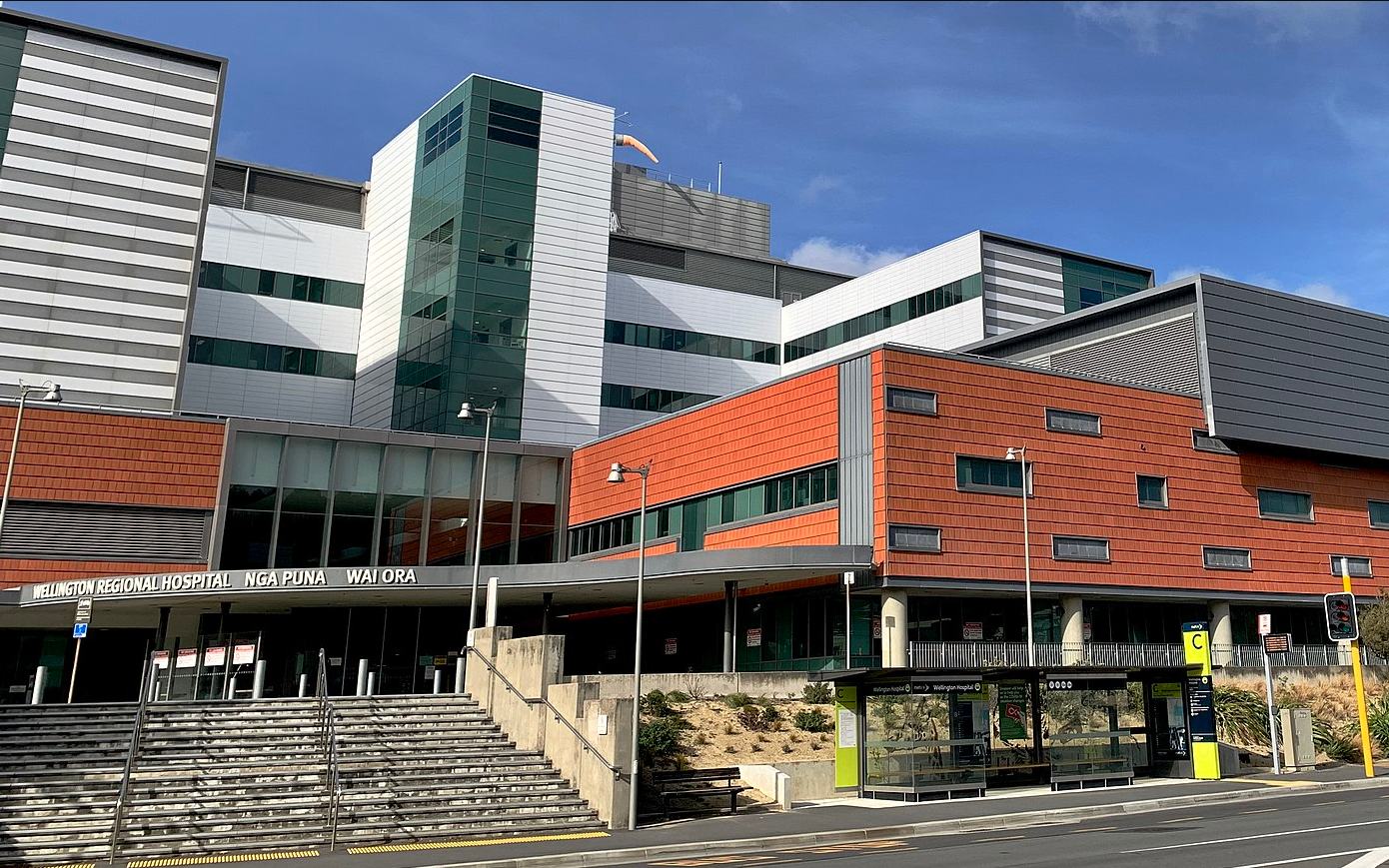World
Out in the World: LGBTQ news from Europe and Asia
Liechtenstein lawmakers approved a marriage equality bill on May 15

ILGA-Europe

ILGA-Europe released its annual Rainbow Europe Map module ranking countries across the continent on the status of LGBTQ rights, revealing that many countries are falling behind as political pressure from far-right politicians grows.
The report was released May 15, just a day after the EU’s Fundamental Rights Agency released its own report detailing a shocking growth in violence experienced by LGBTQ people across member states over the past year.
“Across Europe, LGBTI people are being targeted by hate speech and violence and their human rights are being actively undermined, yet we still see too many countries across the region stalling in moving legal protection forward and not renewing their commitments through national strategies and action plans,” says ILGA-Europe Advocacy Director Katrin Hugendubel.
“This non-action is dangerous, as without proper legislation in place to protect minorities, including LGBTI people, it will be much too easy for newly elected governments to quickly undermine human rights and democracy.”
Once again, Malta held the lead in the country rankings, as it has for the past nine years, scoring 88 percent across ILGA-Europe’s categories of equality and nondiscrimination law, family recognition, hate crime and hate speech laws, legal gender recognition, intersex bodily integrity, civil society space, and asylum policies.
Iceland jumped to second place with 83 percent after passing new laws banning conversion therapy and facilitating legal gender recognition. Belgium reached third place with 78 percent after banning conversion therapy.
At the other end of the spectrum, Russia (2 percent), Azerbaijan (2 percent), and Turkey (5 percent) hold the bottom rankings amid ongoing crackdowns on LGBTQ rights and expression in all three countries. Last year, Russia banned “the LGBT movement” as an “extremist organization.”
Several countries jumped up the rankings in this year’s report, including Greece and Estonia, which both legalized same-sex marriage. Liechtenstein collected points for extending adoption rights to same-sex couples, although it did not collect points for legalizing same-sex marriage, which happened the day after the report was released.
Germany, Bulgaria, Iceland, and Slovenia all collected points for passing legislation on hate crimes and hate speech, while Belgium, Cyprus, Iceland, Norway, and Portugal all collected points for banning conversion therapy.
But the changes haven’t all been positive. Several countries tumbled down the rankings as progress stalled on LGBTQ rights. Montenegro, Finland, Spain, Sweden, and Slovenia all lost points because their governments failed to renew action plans to promote LGBTQ rights. The report also noted the looming threat of right-wing governments across Europe, including in Italy where the national government has restricted the recognition of same-sex parents, and in several countries which are eying restrictions on legal gender recognition and trans health care, including France, UK, Slovakia, and Croatia.
The UK once occupied the top spot on ILGA-Europe’s rankings, but has fallen to 15th place as other countries press ahead on LGBTQ rights while the UK’s Conservative government has increasingly come under the sway of an anti-transgender moral panic.
LIECHTENSTEIN

The Alpine microstate Liechtenstein saw its parliament give final approval to legalizing same-sex marriage in a near-unanimous vote on May 15.
By a vote of 24-1, parliament approved a series of bills that would amend marriage law to allow same-sex couples to marry in the country of about 30,000 people nestled between Switzerland and Austria. The only “no” vote came from an MP from the right-wing populist Democrats for Liechtenstein party.
The new law will come into effect on Jan 1, 2025, as long as it is not vetoed by the prince or challenged in a citizen-initiated referendum. The prince is not expected to veto the bill, as he has previously expressed support for same-sex marriage.
Under the new law, no new civil unions will be registered, although same-sex couples already in same-sex unions will be allowed to continue their unions.
Liechtenstein’s parliament had already amended the law to allow same-sex couples to adopt last year, following an order from the Constitutional Court.
The tiny, conservative-leaning and mostly Catholic country has been slow to adopt LGBTQ rights. It lacks any legal protections from employment discrimination or anti-LGBTQ hate crimes.
ILGA-Europe ranked Liechtenstein 33rd out of 48 states in Europe, with a score of 28 percent on its latest Rainbow Europe Map. This decision on marriage will likely see it rise somewhat in the rankings next year.
The Catholic Church has previously strongly rejected same-sex marriage. Last year, the country’s archbishop, Wolfgang Haas had called same-sex marriage a “diabolical attack against the Creator’s will to salvation,” and cancelled a planned service for opening of Parliament in protest of the law. Haas has since retired.
The decision makes Liechtenstein the last German-speaking country to legalize same-sex marriage.
In a state posted to its Facebook group, the Liechtenstein LGBTQ advocacy group FLay thanked the lawmakers and other supporters who helped get same-sex marriage legalized in the country.
“We are looking forward to introducing marriage for all per 1 January 2025 and thank you to all who have fought for it,” the statement said.
Liechtenstein is the 22nd European country to introduce same-sex marriage, bringing the global total to 38 countries. A bill before the Thai Senate is expected to pass before the summer, which would make it the 39th.
GEORGIA

The government of the former Soviet republic of Georgia says it is close to finalizing a new law against so-called LGBTQ propaganda inspired by similar laws passed in Russia and Belarus in recent years, in what critics say is an attempt to maintain power by stoking divisions on a culturally sensitive issue.
The Georgian capital of Tbilisi has been rocked by protests for weeks as the ruling Georgian Dream party reintroduced a controversial “foreign agents” bill inspired by a similar Russian law, which requires any organization that receives funding from out of the country to register with the government as “organizations serving the interests of a foreign power.”
Critics say the bill is intended to silence and discredit media and civil society that is critical of the government.
May 17 saw intense protests marked by anti-government and pro-European demonstrators marking the International Day Against Homophobia, Biphobia, and Transphobia while anti-LGBTQ protesters, including Prime Minister Irakli Kobakhidze and church leaders took to the streets to mark the government’s competing “Family Purity Day,” Reuters reported.
The party had first introduced the foreign agents bill last year, but withdrew it after months of protests and condemnation from EU countries. The government reintroduced the bill this spring, with some observers suggesting it’s an attempt to tip this October’s national elections in their favor. For weeks, protesters have attempted to halt passage of the law, but parliament gave it final approval May 14. It was vetoed by President Salome Zurabishvili on Saturday, but the government has enough votes in parliament to override the veto.
The proposed anti-LGBTQ law would amend article 30 of the Georgian Constitution to include a host of regulations restricting LGBTQ rights. It would ban recognition of same-sex relationships, ban adoption by gay people or same-sex couples, ban medical interventions to facilitate gender change, restrict recognition of gender to that of biological sex, and ban advocacy for recognition of same-sex couples or trans people.
To pass, the bill would require at least a 3/4 vote of parliament (113 votes), or a 2/3 vote (100 votes) in each of two successive parliaments. The government currently controls 84 of the 150 seats in parliament, but likely believes it can pull enough votes from the opposition to pass the constitutional law.
Critics have noted that both laws put Georgia’s application to join the EU in jeopardy as they clearly attack the fundamental rights at the heart of the union. But while the EU has been sharply critical of the foreign agents law, its criticism of the anti-LGBTQ law has been far more muted.
Local activists say that the EU’s silence has been strategic, as any criticism would play into the hands of Georgian Dream, who claim that LGBTQ rights are a “pseudo-liberal ideology” advanced by a decadent West.
The timing of the bill is likely meant to further divide the opposition as protests mount against the foreign agents law. Georgian Dream has been sliding in the polls since it was returned to power in 2020, but still commands a plurality of support compared to the highly fractured opposition according to most polls.
Georgian Dream politicians have deep ties to Russia, and have increasingly sided with Russia in international and cultural disputes, including by refusing to impose sanction against Russia for the invasion of Ukraine. The support is ironic, considering that Russian forces invaded Georgia in 2008 and continues to support two unrecognized breakaway republics that resulted from that war.
On May 17, U.S. Rep. Joe Wilson (R-S.C.) of the House Foreign Affairs Committee announced that he plans to introduce legislation to sanction Georgian leaders over their assault on democracy and introduce incentives for the government to reverse course.
ILGA-Europe ranked Georgia 36th out of 48 countries, with a score of just 25 percent on its most recent Rainbow Europe Map this week.
UNITED KINGDOM

The Conservative government of the UK has directed schools in England to ban discussion of gender identity in schools and restrict sex education for children under age nine, in an update to statutory guidance issued to schools that is currently under review.
Although the guidance has not yet been released or put into effect, LGBTQ activists and government critics are already comparing the guidance to the notorious Thatcher-era Section 28, which banned discussion of homosexuality in all schools across the UK from 1988 until it was repealed in England and Wales in 2003 and in Scotland in 2000.
The UK has long been in the grip of an anti-trans moral panic, fostered by segments of the ruling Conservative Party that are hostile to trans people and influential British celebrities like “Harry Potter” creator JK Rowling who has long campaigned against trans people’s rights.
Last week, Prime Minister Rishi Sunak appeared on ITV’s daytime talk show “Loose Women,” where he complained that “gender ideology” was infiltrating UK schools.
“Children were being exposed to lots of different things,” Sunak said. “You know, we’ve got lots of people talking to kids, they were talking about [how] you can have 72 different gender identities.”
There is no evidence that children in UK schools are being taught that there are 72 different gender identities or are being taught to engage in inappropriate behavior.
London Mayor Sadiq Khan, who was recently reelected to a third term, blasted the government’s new policy as being harmful to the children the government claims to want to protect.
“We’ve just got to be a bit aware when we have these conversations that we’re conscious about the impact that this has on trans young people,” he said.
“Many of these people — young people — learn about these things through social media. You know, the proliferation of porn, and also the proliferation of misogynists like Andrew Tate. If we’re delaying proper, responsible teaching until later on, I worry about who’s going to be rebutting some of the nonsense on social media.”
Education Secretary Gillian Keegan tried to mollify critics by claiming that the new policy will not restrict discussion of adults who have undergone gender reassignment.
“Gender reassignment” is listed as protected characteristic under the 2010 Equality Act, but the act does not list “gender identity” or “gender expression” as protected characteristics.
“Let me be clear on gender ideology in schools,” Keegan said on BBC Radio 4’s “Today.” “The thing that we’re trying to stop is not gender reassignment. Gender reassignment is something that is a protected characteristic — that adults are allowed to reassign their gender, there’s a process that they go through for that. That is a protected characteristic, and that can be taught.
Gender identity and ideology is something different, and this is part of probably similar campaign groups that have been building this set of materials and this ideology,” she said.
Jo Morgan, the chief executive of Engendering Change, an organization that provides sex education workshops in schools, disputed the idea that schools are teaching children to be trans.
“They are concerned that schools are becoming breeding grounds for transgenderism. There’s no evidence to support that. What we are doing as educators is saying, this is in the news, in social media, it’s everywhere — let’s unpack it together and look at what sources of information you are being exposed to, let’s talk about how this relates to the Equality Act,” Morgan told the Guardian.
ILGA-Europe ranked the UK 15th out of 48 countries with a score of just 52 percent on its most recent Rainbow Europe report, citing a lack of legal protections for trans people and outdated procedures for legal gender recognition.
TAIWAN

Outgoing Taiwanese President Tsai Ing-Wen hosted “RuPaul’s Drag Race” winner Nymphia Wind at a ceremony at her presidential office May 15, in a sign of the growing acceptance of LGBTQ people in the Asian island nation.
The Taiwanese-American performer Nymphia Wind was crowned the winner of season 16 of “RuPaul’s Drag Race” in an episode that aired April 19, taking home the crown and scepter and a cash prize of $200,000. She is the first person of East Asian descent to win the long-running reality competition series. American drag artist Raja, who is of Dutch-Indonesian ancestry, was the first “Drag Race” winner of Asian descent after taking the crown in season three.
Tsai had been quick to offer her congratulations to Wind, posting a message on Instagram just days after her victory. Less than a month later, Wind was in her office, where she performed a trio of songs in full drag — Lady Gaga’s “Marry the Night,” Taiwanese singer Huang Fei’s “Chase, Chase, Chase,” and Jolin Tsai’s gender equality hit “Womxnly,” which she performed with a quintet of backup dancers in drag.
“I want to thank you for demonstrating your fearless beauty, standing up and breaking down barriers,” Tsai said to Wind after her performance, noting that her win “will bring courage to many young people in Taiwan, so they stay fearless and stay true to their hearts.”
Under Tsai’s leadership, Taiwan has become a bastion of liberal values, including progressive attitudes toward LGBTQ people. Among recent landmarks, Taiwan legalized same-sex marriage and adoption, and it banned conversion therapy, and the capital Taipei hosts East Asia’s largest Pride festival.
“Thank you for your contributions to this country, so that I could grow up to be like this today,” Wind told Tsai after her performance. “Thank you for your eight years of dedication, becoming our Taiwan mother.”
Tsai stepped down May 20. Her successor, Vice President Lai Ching-te, last year became the most senior government official to march in Taipei’s Pride parade.
NEW ZEALAND

Activists are calling for greater access to gender-affirming surgeries after the “New Zealand Medical Journal” published a report of a trans teenager who attempted a self-mastectomy at home and had to be treated at hospital.
The teenager, an 18-year-old high school student, had reportedly watched a “how to” video on YouTube and prepared instruments for the surgery himself. He went to the hospital hours into the surgery after he became concerned that he had damaged a nerve while attempting to remove his left breast.
Surgeons at the hospital then removed both breasts, and he was discharged a day later. The report notes that the boy reported higher confidence and self-esteem at a post-operation interview a month later. The hospital’s mental health team assessed that he did not have a psychiatric disorder and was not suicidal, but that he had attempted the surgery as an act of desperation.
“Due to the long wait times of referral in the public healthcare system, an inability to afford a private consultation and the significant psychological stress of having breasts at an upcoming pool party he planned to complete a bilateral (double) self-mastectomy at home,” wrote the report’s authors, Wellington Regional Hospital doctors Mairarangi Haimona, Sue Hui Ong, and Scott Diamond.
Gender-affirming surgeries are covered by New Zealand’s healthcare system, but wait times for surgeries can be lengthy – 10 years or longer for “bottom surgery” by the only doctor in the country who performs it.
Top surgery can be accessed in the parallel private system for around NZ $15,000 (approximately $9,200) and is generally not covered by private health insurance, putting it out of reach for many.
“Transgender people often need to self-advocate for care in the public health system, but with increasing demand and associated psychological and possible physical harm it’s crucial for public services to be more accessible to an under-served population,” the report’s authors concluded.
Self-surgery is an incredibly risky option for trans people — complications can range from scarring to infection to death. And the surgeries may not even work if the patient is taken to the hospital and patched up due to complications.
Te Ahi Wi-Hongi, executive director of the advocacy group Gender Minorities Aotearoa, urges any trans person considering home surgery to avoid it and “hang in there.”
“It might seem right now it’s completely hopeless, but we went from a 40-year waiting list for genital reconstruction surgery to 10 years or less when in 2019 the government made changes [announcing $3 million funding for genital gender-affirming surgery],” Wi-Hongi told the New Zealand Herald.
Africa
LGBTQ groups question US health agreements with African countries
Community could face further exclusion, government-sanctioned discrimination

Some queer rights organizations have expressed concern that health agreements between the U.S. and more than a dozen African countries will open the door to further exclusion and government-sanctioned discrimination.
The Trump-Vance administration since December has signed five-year agreements with Kenya, Uganda, and other nations that are worth a total of $1.6 billion.
Kenyan and Ugandan advocacy groups note the U.S. funding shift from NGO-led to a government-to-government model poses serious risks to LGBTQ people and other vulnerable populations in accessing healthcare due to existing discrimination based on sexual orientation.
Uganda Minority Shelters Consortium, Let’s Walk Uganda, the Kenya Human Rights Commission, and the Center for Minority Rights and Strategic Litigation note the agreements’ silence on vulnerable populations in accessing health care threatens their safety, privacy, and confidentiality.
“Many LGBTQ persons previously accessed HIV prevention and treatment, sexual and reproductive health services, mental health support, and psychosocial care through specialized clinics supported by NGOs and partners such as USAID (the U.S. Agency for International Development) or PEPFAR,” Let’s Walk Uganda Executive Director Edward Mutebi told Washington Blade.
He noted such specialized clinics, including the Let’s Walk Medical Center, are trusted facilities for providing stigma-free services by health workers who are sensitized to queer issues.
“Under this new model that sidelines NGOs and Drop-in Centers (DICs), there is a high-risk of these populations being forced into public health facilities where stigma, discrimination, and fear of exposure are prevalent to discourage our community members from seeking care altogether, leading to late testing and treatment,” Mutebi said. “For LGBTQ persons already living under criminalization and heightened surveillance, the loss of community-based service delivery is not just an access issue; it is a full-blown safety issue.”
Uganda Minority Shelters Consortium Coordinator John Grace said it is “deeply troubling” for the Trump-Vance administration to sideline NGOs, which he maintains have been “critical lifelines” for marginalized communities through their specialized clinics funded by donors like the Global Fund and USAID.
USAID officially shut down on July 1, 2025, after the White House dismantled it.
Grace notes the government-to-government funding framework will impact clinics that specifically serve the LGBTQ community, noting their patients will have to turn to public systems that remain inaccessible or hostile to them.
“UMSC is concerned that the Ugandan government, under this new arrangement, may lack both the political will and institutional safeguards to equitably serve these populations,” Grace said. “Without civil society participation, there is a real danger of invisibility and neglect.”
Grace also said the absence of accountability mechanisms or civil society oversight in the U.S. agreement, which Uganda signed on Dec. 10, would increase state-led discrimination in allocating health resources.
Center for Minority Rights and Strategic Litigation Legal Manager Michael Kioko notes the U.S. agreement with Kenya, signed on Dec. 4, will help sustain the country’s health sector, but it has a non-binding provision that allows Washington to withdraw or withhold the funding at any time without legal consequences. He said it could affect key health institutions’ long-term planning for specialized facilities for targeted populations whose independent operations are at stake from NGOS the new agreement sidelines.
“The agreement does not provide any assurance that so-called non-core services, such as PrEP, PEP, condoms, lubricants, targeted HIV testing, and STI prevention will be funded, especially given the Trump administration’s known opposition to funding these services for key populations,” Kioko said.
He adds the agreement’s exclusionary structure could further impact NGO-run clinics for key populations that have already closed or scaled down due to loss of the U.S. funding last year, thus reversing hard-won gains in HIV prevention and treatment.
“The socio-political implications are also dire,” Kioko said. “The agreement could be weaponized to incite discrimination and other LGBTQ-related health issues by anti-LGBTQ voices in the parliament who had called for the re-authorization of the U.S. funding (PEPFAR) funding in 2024, as a political mileage in the campaign trail.”
Even as the agreement fails to safeguard specialized facilities for key populations, the Kenya Human Rights Commission states continued access to healthcare services in public facilities will depend on the government’s commitment to maintain confidentiality, stigma-sensitive care, and targeted outreach mechanisms.
“The agreement requires compliance with applicable U.S. laws and foreign assistance policies, including restrictions such as the Helms Amendment on abortion funding,” the Kenya Human Rights Commission said in response to the Blade. “More broadly, funded activities must align with U.S. executive policy directives in force at the time. In the current U.S. context, where executive actions have narrowed gender recognition and reduced certain transgender protections, there is a foreseeable risk that funding priorities may shift.”
Just seven days after Kenya and the U.S. signed the agreement, the country’s High Court on Dec. 11 suspended its implementation after two petitioners challenged its legality on grounds that it was negotiated in secrecy, lacks proper parliamentary approval, and violates Kenyans’ data privacy when their medical information is shared with America.
The agreement the U.S. and Uganda signed has not been challenged.
European Union
European Parliament resolution backs ‘full recognition of trans women as women’
Non-binding document outlines UN Commission on the Status of Women priorities

The European Parliament on Feb. 12 adopted a transgender-inclusive resolution ahead of next month’s U.N. Commission on the Status of Women meeting.
The resolution, which details the European Union’s priorities ahead of the meeting, specifically calls for “the full recognition of trans women as women.”
“Their inclusion is essential for the effectiveness of any gender-equality and anti-violence policies; call for recognition of and equal access for trans women to protection and support services,” reads the resolution that Erin in the Morning details.
The resolution, which is non-binding, passed by a 340-141 vote margin. Sixty-eight MPs abstained.
The commission will meet in New York from March 10-21.
A sweeping executive order that President Donald Trump signed shortly after he took office for a second time on Jan. 20, 2025, said the federal government’s “official policy” is “there are only two genders, male and female.” The Trump-Vance administration has withdrawn the U.S. from the U.N. LGBTI Core Group, a group of U.N. member states that have pledged to support LGBTQ and intersex rights, and dozens of other U.N. entities.
India
Trans students not included in new India University Grants Commission equity rules
Supreme Court on Jan. 29 delayed implementation

The University Grants Commission is a regulatory body under India’s Education Ministry that is responsible for coordinating and maintaining standards in higher education. The University Grants Commission Equity Regulations, 2026, aim to address discrimination and promote the inclusion of lower castes, tribes, people with disabilities, those who are economically disadvantaged, and other marginalized groups in higher education.
The regulations quickly triggered controversy.
Students, faculty and civil society groups criticized them, largely around concerns about potential discrimination against students and the absence of certain procedural safeguards. Yet, even as the debate intensified, there was little public discussion about the lack of explicit mention of transgender students in the framework. The omission, though not central to the overall controversy, raised questions among some advocates about the scope of the regulations and who they ultimately protect.
According to the All India Survey on Higher Education, trans student enrollment in universities and colleges rose from 302 in the 2020-2021 academic year to 1,448 in the 2022-2023 academic year, reflecting a sharp increase but still representing a very small share of India’s overall higher education population.
The Supreme Court in its 2024 National Legal Services Authority v. Union of India affirmed trans people are entitled to full constitutional protection, including equality, dignity and access to education, and directed governments to treat them as a socially and educationally disadvantaged group eligible for quota-based protections in education and public employment. The ruling recognized gender identity as integral to personal autonomy and held that discrimination on this ground violates fundamental rights under Articles 14, 15, 16, and 21.
Against this legal backdrop, the regulations do not explicitly reference trans students, an omission that has drawn attention in discussions on how constitutional protections are implemented within higher education institutions.
In the Indian constitutional framework, Articles 14, 15, 16, and 21 collectively form the foundation of equality and personal liberty.
Article 14 guarantees equality before the law and equal protection of laws; Article 15 prohibits discrimination on grounds such as religion, race, caste, sex or place of birth; Article 16 ensures equality of opportunity in public employment; and Article 21 protects the right to life and personal liberty, which courts have interpreted to include dignity, autonomy, and access to education. These provisions underpin judicial recognition of protections for marginalized communities, including trans people, within public institutions.
Judicial and policy frameworks in India have increasingly recognized the need for institutional support for trans students, underscoring the contrast with the absence of explicit mention in the University Grants Commission Equity Regulations, 2026, regulations.
The Madras High Court has directed educational institutions to implement measures such as gender-neutral restrooms, mechanisms to update name and gender in official records, inclusion of trans identities in application forms and the appointment of LGBTQ-inclusive counselors for grievance redressal alongside enforcement of the Transgender Persons (Protection of Rights) Act and its Rules.
Policy instruments have echoed similar priorities.
The National Youth Policy 2014 acknowledged trans youth as a group facing social stigma and called for targeted interventions, while the National Education Policy 2020 emphasized reducing dropout rates and ensuring equitable access to education. The University Grants Commission itself has previously indicated that universities should adopt affirmative steps and institution-specific plans to support trans people, making their absence from the current regulatory text more pronounced.
Research and policy analyses have consistently documented structural barriers faced by trans students in India’s education system. The Center for Development Policy and Practices and other academic studies note that discrimination, bullying, and the absence of gender-sensitive infrastructure contribute to high dropout risks among trans students in both school and higher education. Census data underscore this disparity.
The 2011 Census recorded a literacy rate of about 56.1 percent among trans people, significantly lower than the national average of roughly 74 percent, reflecting long-standing barriers to access and retention in formal education.
The controversy intensified after the Supreme Court on Jan. 29 stayed the implementation of the University Grants Commission Equity Regulations, 2026, and agreed to examine their constitutional validity.
A bench led by Chief Justice Surya Kant observed the regulations raised serious legal questions, including concerns that some provisions appeared vague and potentially open to misuse, and sought responses from the federal government and the University Grants Commission. The court directed that the earlier 2012 anti-discrimination framework would remain in force in the interim and listed the matter for further hearing, signalling the need for detailed judicial scrutiny.
Public and political reactions followed, with student groups, academics, and political actors divided over the stay and the broader policy direction. The federal government, led by Prime Minister Narendra Modi, maintained the regulations were intended to address caste-based discrimination and strengthen accountability within higher education institutions even as debate intensified nationally.
The regulations go beyond paperwork. They require universities to create on-campus equity monitoring teams and designated officers responsible for identifying incidents of discrimination, receiving complaints and reporting them to institutional committees for action. However, while the framework spells out protections for certain caste and social categories, it does not explicitly include trans students within this structure. In practice, that absence could leave uncertainty about whether routine monitoring, reporting and grievance mechanisms would extend to them with the same clarity, particularly in campuses where implementation already varies widely.
The regulations also prescribe penalties for faculty and staff found responsible for discrimination, including suspension, withholding of promotions, or termination of service following institutional inquiry. For students, disciplinary action may range from warnings to suspension depending on the severity of the misconduct. Where an incident amounts to a violation of existing statutory or criminal law, institutions are required to refer the matter to law enforcement authorities, placing responsibility on universities to escalate cases beyond internal mechanisms when warranted.
The regulations do not create new criminal offences but require institutions to escalate cases to law enforcement when conduct violates existing statutes. These may include the Scheduled Castes and Scheduled Tribes (Prevention of Atrocities) Act, relevant provisions of the country’s penal code, such as criminal intimidation, assault or sexual harassment, disability rights protections, workplace harassment laws, and statutes addressing campus hazing. The framework is therefore stringent: campus inquiries can lead to disciplinary action, and, where legal thresholds are met, mandatory reporting to police. In the absence of explicit mention of trans students within the framework, questions remain about how individuals from the community would navigate complaint systems, interact with authorities, and access consistent institutional protections under these processes.
The Scheduled Castes and Scheduled Tribes (Prevention of Atrocities) Act, 1989 is among India’s strictest anti-discrimination criminal laws and applies to students, staff and any individual accused of caste-based offences. It criminalizes acts such as intentional insults or humiliation, social exclusion, threats, physical assault and other forms of harassment directed at members of specific castes or tribes. Offenses under the law can lead to arrest, non-bailable charges in several categories, and imprisonment that may extend from months to years depending on the severity of the conduct, along with fines. The law also restricts anticipatory bail in many cases and mandates prompt registration of complaints, which is why it is often viewed as a powerful legal safeguard for marginalized communities while also being regarded by some as carrying serious legal consequences once invoked.
Nishikant Dubey, a member of India’s ruling Bharatiya Jana Party, welcomed the Supreme Court’s decision to stay the regulations, stating the judges had acted appropriately and that the matter required careful legal scrutiny. Indrani Chakraborty, an LGBTQ rights activist and mother of a trans woman, told the Washington Blade the University Grants Commission Equity Regulations, 2026, is a welcome step toward supporting vulnerable students.
“The saddest part is that the transgender community is excluded which is very unfair,” said Chakraborty. “Presently, the transgender community is the most vulnerable and not mentioning the community in the act. I regard it as the biggest discrimination and will never help in changing the scenario of the transgender students.”
Chakraborty told the Blade the trans community, as a minority facing persistent social stigma and taboo, is often overlooked and must repeatedly advocate even for basic rights.
“I believe that grouping of individuals under caste, religion, gender, etc., is the base of discrimination. Personally, I disagree with naming and tagging any individual. Equity over equality is the need now for the most vulnerable. And the transgender community faces discrimination the most. Discrimination against any individual in educational institutions needs immediate attention and preventive measures should be necessarily implemented.”
Chakraborty said the absence of explicit inclusion of trans students amounts to discrimination, undermining equality in education and violating human dignity.
Ankit Bhupatani, a global diversity, equity and inclusion leader and LGBTQ activist, told the Blade that debate around the University Grants Commission Equity Regulations, 2026, has largely centered on concerns raised by relatively privileged students, particularly those in the unreserved category, while communities with limited visibility in higher education have received far less attention. Bhupatani also referenced the All India Survey on Higher Education statistics.
“According to Queerbeat, more than half of these 1,448 students are clustered in a few states and several large states still report almost no transgender students at all. Any serious equity regime has to guard every individual, including upper-caste students who are unfairly targeted or stereotyped , but the public conversation cannot pretend this tiny, highly vulnerable group does not exist,” said Bhupatani. “When outrage dominates headlines and the most marginalized are barely mentioned, the word ‘equity’ starts to lose meaning.”
Bhupatani told the Blade that the University Grants Commission Equity Regulations, 2026, define gender to include the “third gender” and prohibit discrimination on that basis, but then repeatedly identify lower castes, tribes, economically disadvantaged groups, people with disabilities, and women as specific groups, while trans students and teachers are not explicitly listed. Bhupatani said that for a young trans person reading the regulations, the message can feel indirect — that others are clearly recognized while their protections depend on interpretation. He added that explicitly naming trans people as a protected group would not dilute safeguards for others, but would instead ensure those already facing stigma are not left to seek recognition case by case.
“Transgender people sit at the intersection of legal vulnerability and social prejudice, so if they are not named and centered in large regulatory exercises, they quickly disappear from view,” said Bhupatani. “Campus rules need to start with a simple moral intuition. No one, whether Dalit or Brahmin, trans or cis, rich or poor, should be harassed, excluded or denied opportunity because of who they are. The University Grants Commission (Promotion of Equity in Higher Education Institutions) Regulations, 2026 already move in this direction by defining discrimination broadly for all students and staff and by listing grounds such as caste, gender, religion, disability, and place of birth. That universal shift is essential.”
Bhupatani said a fair equity framework should operate on two levels. First, it must guarantee that any individual, regardless of background, can seek redress if treated unfairly. Second, it should explicitly identify groups that face entrenched barriers — including lower castes and tribes, people with disabilities, and trans people — and build specific safeguards for them. He added that concerns about misuse could be addressed through clearer definitions, transparent procedures, trained inquiry committees, representation from diverse groups, and meaningful penalties for false or malicious complaints.
Kalki Subramaniam, a trans activist and artist, told the Blade that trans students face layered vulnerabilities — including social stigma, harassment, and systemic neglect — that often go unaddressed on campuses. When policies do not explicitly name them, she said, it signals that their struggles are not seen as warranting recognition, reinforcing isolation, and undermining their ability to access safe and dignified education.
“I have faced this and I really do not want this generation of transgender students to go through the same kind of exclusion and treatment,” said Subramaniam. “If the government truly believes in inclusive education, transgender students must be explicitly recognised in every policy conversation. Otherwise, we remain erased from the very spaces that claim to be suitable. We will certainly urge the government to ease and prioritise education for transgender community students.”
Subramaniam said limiting protections primarily to caste categories reflects a narrow approach to justice, noting that discrimination on campuses can also be shaped by gender, class, disability, and sexuality. She said a more expansive framework would protect any student facing discrimination, regardless of identity, and emphasized that equity must operate universally for campuses to function as spaces of learning rather than exclusion.
-

 Canada5 days ago
Canada5 days agoShooter who killed 7 people inside Canada school was transgender
-

 Russia5 days ago
Russia5 days agoRussia’s anti-LGBTQ crackdown takes absurd turn
-

 Health5 days ago
Health5 days agoCMS moves to expand HIV-positive organ transplants
-

 State Department4 days ago
State Department4 days agoFOIA lawsuit filed against State Department for PEPFAR records


















